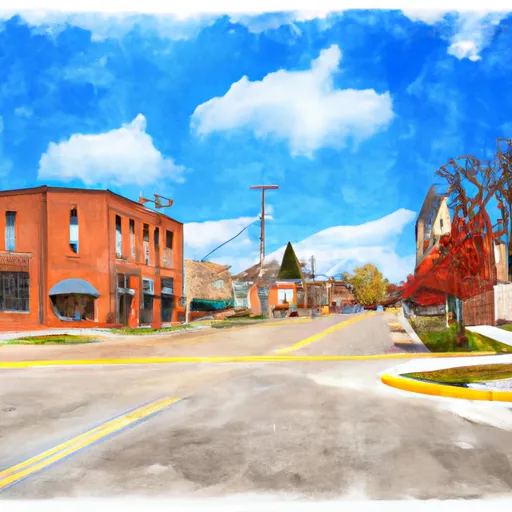-
 Snoflo Premium
Snoflo Premium
Get unlimited access to all our content
With no Ad interruptions! - Start Your Free Trial Login with existing account
Meppen
Eden Index
Climate
8.3
•
Recreation
3.4
•
Community
2.6
•
Safeguard
5.1/10

Meppen is a small village located in Calhoun County, Illinois. The area experiences a humid continental climate, characterized by four distinct seasons. Summers are typically warm and humid, with average temperatures ranging from 70°F (21°C) to 90°F (32°C). Winters are cold, with temperatures averaging between 20°F (-7°C) and 40°F (4°C). Precipitation is fairly evenly distributed throughout the year, with thunderstorms occurring during the summer months.
Hydrologically, Meppen is situated near the Illinois River, offering various water-related recreational activities. Fishing enthusiasts can cast their lines for popular species such as catfish, bass, and crappie. Boating and kayaking are also popular, with opportunities to explore the scenic Illinois River and its tributaries.
Apart from water activities, Meppen also boasts several outdoor recreation options. Nearby conservation areas and state parks provide opportunities for hiking, biking, and wildlife viewing. Calhoun County is known for its abundant birdlife, including bald eagles, making it a popular destination for birdwatchers.
In summary, Meppen, Illinois offers a diverse climate with distinct seasons, a proximity to the Illinois River providing hydrological opportunities, and a variety of outdoor recreation activities to explore and enjoy.
What is the Eden Index?
The Snoflo Eden Index serves as a comprehensive rating system for regions, evaluating their desirability through a holistic assessment of climate health, outdoor recreation opportunities, and natural disaster risk, acknowledging the profound impact of these factors on livability and well-being.
Climate Health Indicator (CHI): 8.3
Meppen receives approximately
1001mm of rain per year,
with humidity levels near 82%
and air temperatures averaging around
13°C.
Meppen has a plant hardyness factor of
6, meaning
plants and agriculture in this region thrive during a short period during spring and early summer. Most
plants will die off during the colder winter months.
By considering the ideal temperature range, reliable water supplies, clean air, and stable seasonal rain or snowpacks, the Climate Health Indicator (CHI) underscores the significance of a healthy climate as the foundation for quality living.
A healthy climate is paramount for ensuring a high quality of life and livability in a region, fostering both physical well-being and environmental harmony. This can be characterized by ideal temperatures, reliable access to water supplies, clean air, and consistent seasonal rain or snowpacks.
Weather Forecast
Streamflow Conditions
Lower Illinois
Area Rivers
Lower Illinois
Snowpack Depths
Lower Illinois
Reservoir Storage Capacity
Lower Illinois
Groundwater Levels
Recreational Opportunity Index (ROI): 3.4
The Recreational Opportunity Index (ROI) recognizes the value of outdoor recreational options, such as parks, hiking trails, camping sites, and fishing spots, while acknowledging that climate plays a pivotal role in ensuring the comfort and consistency of these experiences.
Access to outdoor recreational opportunities, encompassing activities such as parks, hiking, camping, and fishing, is crucial for overall well-being, and the climate plays a pivotal role in enabling and enhancing these experiences, ensuring that individuals can engage in nature-based activities comfortably and consistently.
Camping Areas
| Campground | Campsites | Reservations | Toilets | Showers | Elevation |
|---|---|---|---|---|---|
| Washington State Park | None | 637 ft | |||
| South Recreation Composite | 100 | 140 ft | |||
| St. Peters 370 Lakeside Park | 50 | 426 ft | |||
| North Rec Composite | 15 | 97 ft | |||
| Babler Memorial State Park | None | 733 ft | |||
| St. Francois State Park | None | 777 ft | |||
| Tickfaw State Park | None | 15 ft | |||
| Percy Quin State Park | None | 416 ft | |||
| Greenville - Lake Wappapello | None | 382 ft | |||
| Pere Marquette State Park | 80 | 644 ft |
Nearby Ski Areas
Catastrophe Safeguard Index (CSI):
The Catastrophe Safeguard Index (CSI) recognizes that natural disaster risk, encompassing floods, fires, hurricanes, and tornadoes, can drastically affect safety and the overall appeal of an area.
The level of natural disaster risk in a region significantly affects safety and the overall livability, with climate change amplifying these risks by potentially increasing the frequency and intensity of events like floods, fires, hurricanes, and tornadoes, thereby posing substantial challenges to community resilience and well-being.
Community Resilience Indicator (CRI): 2.6
The Community Resilience Indicator (CRI) recognizes that education, healthcare, and socioeconomics are crucial to the well-being of a region. The CRI acknowledges the profound impact of these elements on residents' overall quality of life. By evaluating educational resources, healthcare accessibility, and economic inclusivity, the index captures the essential aspects that contribute to a thriving community, fostering resident satisfaction, equity, and social cohesion.

